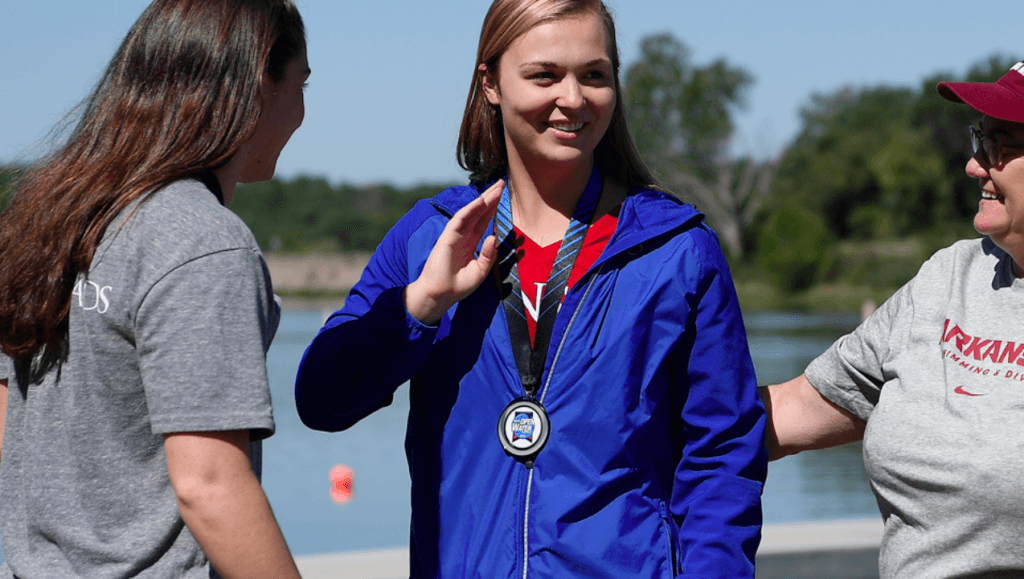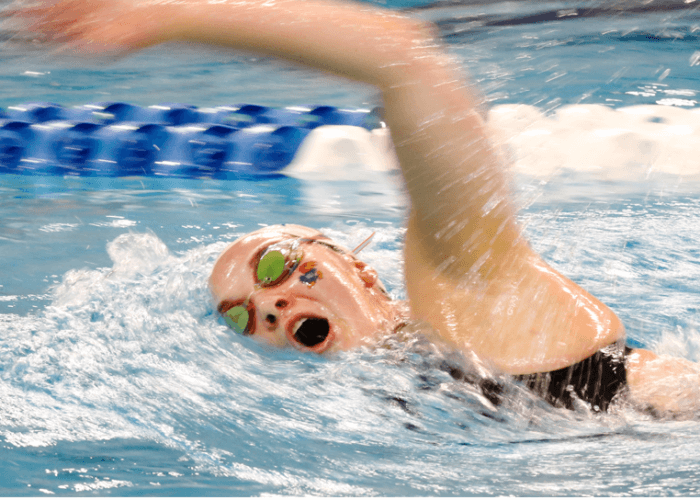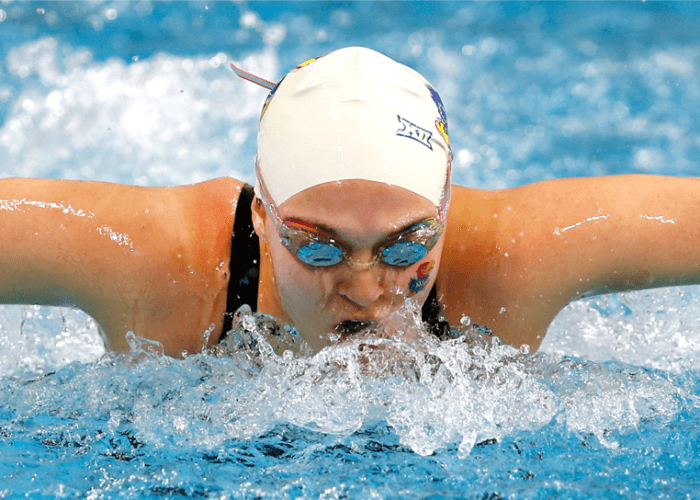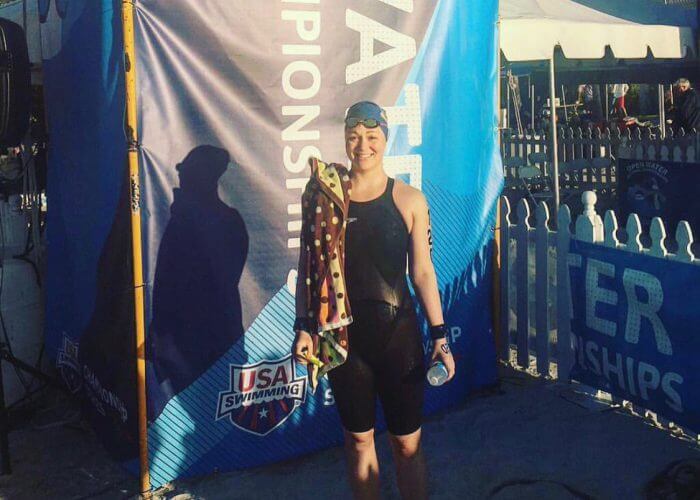Q&A on Resurfacing After Surgery with University of Kansas Swimmer Libby Walker

By Haley Wen, Swimming World College Intern.
Libby Walker has been a swimmer all her life. Her mom was a swim coach, which led her to want to join in on the action at the pool from a young age. Walker started swimming year-round at just four years old. She went on to qualify for the 2016 Olympic Trials in the 200 Butterfly at age 18. She went on to earn a spot swimming distance Freestyle, IM and Butterfly for the University of Kansas (KU).
With such success at such a young age, the swimming world was Walker’s oyster. Unfortunately, that all changed when she was forced to face injury: not one, but two torn labrums in her hips, both requiring major surgery and lengthy recovery periods. This experience is not unique to Walker. Many swimmers will face career-threatening injuries. In Walker’s case, her injury led her to take a redshirt season her junior year of college. Now, in the midst of getting ready to graduate and prepare for her final season of college swimming, she took the time to talk about her experience.

Photo Courtesy: Kansas Athletics
Swimming World: When did you realize something was wrong with your first hip?
Walker: It was my first week back lifting heavy with KU the first week of the summer after my Sophomore year of college. I think it was our third lift of the week and I remember my groin being really sore and tight. I tried to stretch it during my swim after and that’s when the pain really started.
SW: What was the process like getting diagnosed?
Walker: It was a kind of long process. My athletic trainer initially thought I strained my hip flexor, but after a week or so she noticed it wasn’t presenting like a normal strain. From there, the medical staff at KU wanted to rule out a hernia. I had an ultrasound and MRI and nothing major showed up. After all of this, I went to see a physician in my hometown and he immediately thought my labrum was torn. We determined it was a labrum tear after an x-ray and an MRI with a dye injection.
SW: How did you ultimately decide to have the surgery rather than attempt to wait it out? What factors played into your decision to take a redshirt season?
Walker: I knew after rehabbing my hip all summer that it wasn’t really helping or fixing the problem. A lot of times people tear their labrum and it doesn’t bother them consistently. Because my hip bones formed abnormally I had impingement and that caused a lot of consistent nagging pain. This pain kept me from doing things because I needed to make sure I was in the least amount of pain to get through practice. My quality of life and quality of training was suffering. Having surgery was a really tough decision, but it really was the logical option. Being able to redshirt was a huge part in why having surgery was the best decision. I knew I could have surgery and recover so that I could make the most of my two years of eligibility left.
SW: What was recovery like after your first surgery?

Photo Courtesy: Kansas Athletics
Walker: Recovery was one of the hardest things I have ever done. I spent over 10 hours a week with my athletic trainer. I had physical therapy at my orthopedic surgeon’s office on top of that. The hardest part was definitely watching my teammates compete and not being able to swim alongside them.
SW: When did you realize you were experiencing the same injury with your other hip?
Walker: I had moments during rehab for my first surgery where my left hip would hurt but it was very fleeting pain. I was warming up in the weight room at KU and I felt my left hip kind of pop during our walking stretch series. This was a week after I got cleared from my first surgery.
SW: How was recovery from your second surgery? Was it easier or harder in any way?
Walker: The recovery actually looked a lot different from my first one. Since I had the surgery after rehabbing my other hip, I was strong in the necessary ways to recover quicker. I ended up going home right after the second surgery and worked just with a physical therapist because I did not have access to my athletic trainer from KU. I think knowing what to expect helped so much the second time around and made it a lot easier in a lot of ways.
SW: What has swimming after all of this felt like? What has changed and what hasn’t?
Walker: Swimming post surgery has been a huge challenge physically and mentally. My body can’t handle what it used to volume wise during practice. This past season I had a hard time recovering because I just wasn’t used to doing what I was doing. When you go from training hard 99% of the year for over ten years it’s hard to get back to it when you took almost a full year off from traditional training.
One awesome thing that came out of rehabbing after two hip surgeries was being so much aware of my body and being able to activate my muscles and use them properly. This has allowed me to lift better and heavier. I think swimmers a lot of times have trouble with certain things outside of the water because they aren’t used to activating certain muscles out of the water. I think having two surgeries has made me a more well rounded athlete.

Photo Courtesy: Libby Walker
SW: What do you feel you’ve learned from this experience? Has it altered your perspective on swimming or college, or life in general?
Walker: I’ve learned so much about myself and life in general from this experience. I’ve always been so consumed by swimming and doing every little thing right. I was forced to take a step back ad gain perspective on the sport because of my surgery. I was able to realize my competencies outside of swimming. It has also changed the way I view myself. This past year I allowed myself to have more fun and not take things so seriously. I think this allowed me to have a successful season. My goals for my last year of swimming are more centered on being the best version of myself and being a good teammate more so than times. I feel like if I’m working hard and having fun I’m going to swim well and the times will come. I’m glad that this experience has allowed me to have a better relationship with myself and the sport. As hard as having two major surgeries back to back was, it forced me to grow in ways that will help me transition into life after swimming more smoothly.
Walker graduated this spring with a with a bachelor’s degree in journalism and a double minor in business and psychology. During her last season of eligibility she is pursuing a master’s degree in digital content strategy.
–All commentaries are the opinion of the author and do not necessarily reflect the views of Swimming World Magazine nor its staff.




Great article on your amazing girl Brenda Rutter Walker